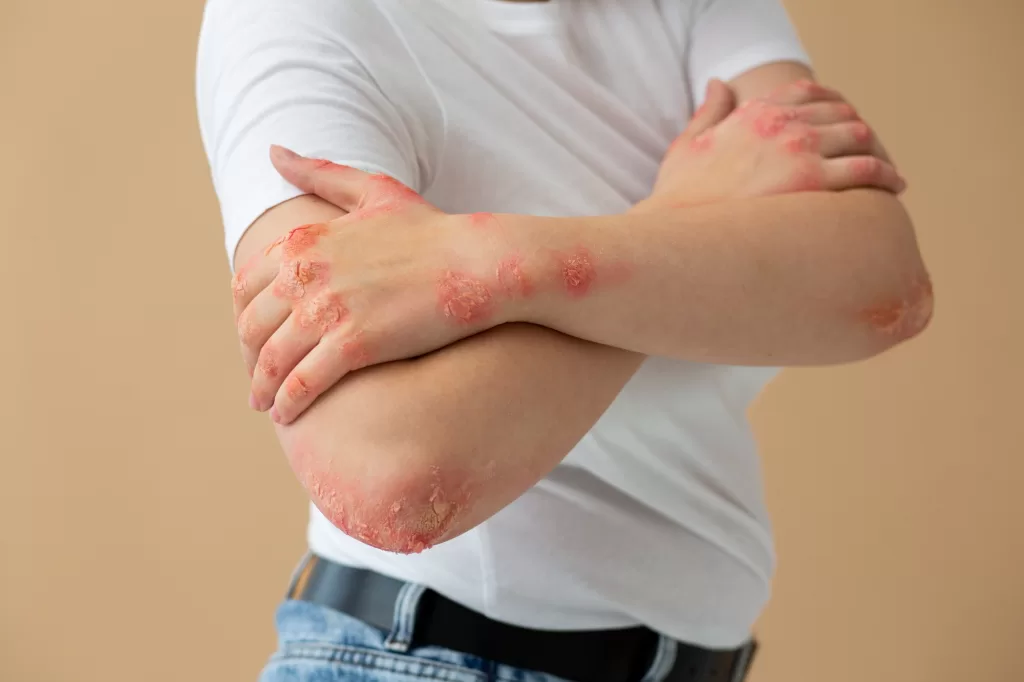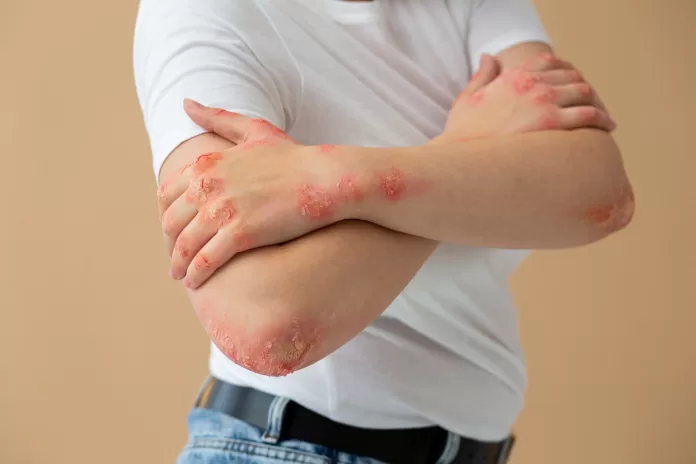
Eczema, a chronic skin condition, affects millions of people worldwide. Characterized by inflamed, itchy skin, it can significantly impact quality of life. This guide will explore eczema’s symptoms, types, triggers, and management strategies, providing valuable insights for sufferers, dermatology enthusiasts, and health-conscious readers alike.
Introduction to Eczema
Eczema, also known as atopic dermatitis, is a common inflammatory skin disorder affecting individuals of all ages. It is estimated that over 31 million Americans suffer from eczema, with a significant portion experiencing severe symptoms. The condition can disrupt daily activities, causing discomfort, embarrassment, and stress. Understanding eczema’s underlying causes and manifestations is crucial for effective management.
Common Eczema Symptoms
Recognizing eczema symptoms is the first step in managing the condition. While symptoms can vary among individuals, common signs include:
- Itching: Often intense and persistent, itching is a hallmark symptom that can lead to scratching, further aggravating the skin.
- Redness and Inflammation: Affected areas may appear red, swollen, and irritated.
- Dryness and Flaking: The skin can become excessively dry, leading to flaking and peeling.
- Blisters and Oozing: Some individuals may experience small, fluid-filled blisters that ooze when scratched.
- Thickened Skin: Chronic scratching and rubbing can result in lichenification, where the skin becomes thick and leathery.
- Dark Patches: Some people develop dark patches on the skin, especially those with darker skin tones.
Understanding these symptoms and their variations can help individuals seek appropriate treatment and manage their condition effectively.
Types of Eczema
Eczema is not a one-size-fits-all condition. Several types exist, each with unique characteristics and triggers:
Atopic Dermatitis
The most common form of eczema, atopic dermatitis, typically begins in childhood and often persists into adulthood. It is associated with a family history of allergies and asthma. Symptoms include dry, scaly patches on the skin, particularly on the face, arms, and legs.
Contact Dermatitis
Contact dermatitis occurs when the skin comes into direct contact with an irritant or allergen. Symptoms include redness, itching, and blistering. Common triggers are soaps, detergents, cosmetics, and certain metals like nickel.
Dyshidrotic Eczema
Characterized by small, itchy blisters on the hands and feet, dyshidrotic eczema is often triggered by stress, allergens, or exposure to water. The blisters can be painful and may lead to skin cracking.
Nummular Eczema
Nummular eczema appears as coin-shaped patches of irritated skin. These patches can be intensely itchy and are often triggered by dry skin and environmental factors.
Seborrheic Dermatitis
Often affecting areas with oil-producing glands, such as the scalp and face, seborrheic dermatitis causes red, scaly patches. It is commonly known as dandruff when it occurs on the scalp.
Stasis Dermatitis
Stasis dermatitis occurs in individuals with poor circulation, typically in the lower legs. Symptoms include swelling, redness, and skin ulcers.
Recognizing the type of eczema can guide treatment decisions and help manage symptoms effectively.
Eczema Triggers
Eczema is often exacerbated by triggers, which can vary from person to person. Identifying and avoiding these triggers is crucial for managing the condition:
Environmental Triggers
- Temperature Changes: Extreme temperatures, whether hot or cold, can worsen eczema symptoms.
- Humidity Levels: Low humidity tends to dry out the skin, while high humidity can exacerbate sweating and irritation.
- Pollutants: Airborne pollutants and chemicals can irritate sensitive skin.
- Pollen and Dust Mites: Common allergens can trigger flare-ups in susceptible individuals.
Dietary Triggers
Certain foods can trigger eczema symptoms in some people. Common dietary triggers include dairy, eggs, nuts, and gluten. An elimination diet under medical supervision can help identify offending foods.
Lifestyle Triggers
- Stress: Emotional stress is a well-known trigger for eczema flare-ups.
- Sweating: Excessive sweating from exercise or heat can irritate the skin.
- Personal Care Products: Fragrances, preservatives, and alcohol in skincare products can irritate sensitive skin.
Identifying individual triggers and taking steps to avoid them can help prevent eczema flare-ups and improve overall skin health.
Diagnosing Eczema
A proper diagnosis is essential for effective eczema management. Dermatologists typically use the following methods:
Medical History
A thorough medical history helps identify potential triggers and underlying conditions. Family history of allergies or asthma can provide valuable insights.
Physical Examination
A physical examination of the skin can reveal characteristic signs of eczema, such as redness, scaling, and lichenification.
Allergy Testing
Allergy testing, including patch tests and blood tests, can identify specific allergens that may be contributing to eczema symptoms.
Accurate diagnosis allows for tailored treatment plans that address individual needs and improve long-term outcomes.
Managing Eczema
Managing eczema involves a comprehensive approach that includes both conventional and alternative treatments:
Conventional Treatments
- Topical Corticosteroids: These anti-inflammatory creams reduce redness and itching. They are commonly prescribed for short-term use during flare-ups.
- Calcineurin Inhibitors: Non-steroidal creams that help reduce inflammation and itching, particularly for sensitive areas like the face.
- Oral Medications: Antihistamines can relieve itching, while oral corticosteroids may be prescribed for severe cases.
- Phototherapy: Exposure to controlled ultraviolet light can help reduce inflammation and improve symptoms.
Alternative Treatments
- Moisturizers: Regular use of emollients helps maintain skin hydration and prevent dryness.
- Dietary Supplements: Omega-3 fatty acids and probiotics may support skin health and reduce inflammation.
- Herbal Remedies: Chamomile and calendula creams have soothing properties that can help alleviate symptoms.
A personalized treatment plan that combines conventional and alternative approaches can effectively manage eczema and improve quality of life.
Living with Eczema
Managing eczema goes beyond treatment; lifestyle adjustments can significantly impact symptom control:
Skincare Routine
- Gentle Cleansing: Use mild, fragrance-free cleansers to avoid irritating the skin.
- Moisturizing: Apply moisturizer immediately after bathing to lock in moisture.
- Avoid Hot Water: Opt for lukewarm baths or showers to prevent drying out the skin.
Stress Management
Practicing relaxation techniques, such as yoga and meditation, can reduce stress and minimize flare-ups.
Social Situations
Openly discussing eczema with friends and family can foster understanding and support. Wearing loose, breathable clothing can prevent irritation during social events.
Adopting these lifestyle changes can make living with eczema more manageable and enhance overall well-being.
Future of Eczema Treatment
Exciting advancements in eczema research hold promise for improved treatment options:
Biologics
Biologic medications target specific immune pathways involved in eczema, offering targeted and effective treatment for severe cases.
Gene Therapy
Research into genetic factors contributing to eczema may pave the way for gene-based therapies that address the root causes of the condition.
Microbiome Research
Exploring the role of the skin microbiome in eczema development may lead to innovative treatments that restore microbial balance and improve skin health.
The future of eczema treatment looks promising, with ongoing research bringing hope for more effective and personalized therapies.
Conclusion
Eczema is a complex condition with diverse symptoms and triggers. Understanding the different types of eczema, identifying personal triggers, and implementing effective management strategies are key to improving quality of life. Whether through conventional treatments, alternative therapies, or lifestyle adjustments, individuals can take control of their eczema and achieve healthier skin.
If you’re struggling with eczema, don’t hesitate to seek professional help from a dermatologist. With the right guidance and support, managing eczema is within reach. Visit Healthfunda.net for more information and resources on eczema care.


